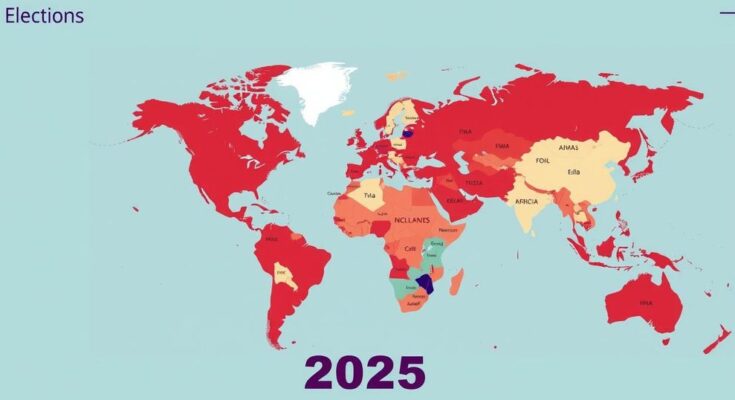In 2025, critical elections will occur in several nations, including Belarus, Germany, Canada, Australia, and Egypt. These elections follow a turbulent 2024 and will significantly impact the political landscape, with incumbents facing strong opposition and shifting voter sentiments in various contexts. The implications of these elections are extensive, reflecting a global struggle for democratic governance.
In 2025, a series of significant elections are set to take place around the globe, shaping the political landscapes of various nations. Notably, elections in Belarus, Germany, Canada, Australia, and Egypt are among the most anticipated, each with unique political contexts and implications. As countries navigate challenges related to incumbency and opposition dynamics, these elections will provide crucial insight into the evolving global political scene.
In Belarus, the presidential election on January 26, 2025, will see incumbent Alexander Lukashenko, a loyal ally of Vladimir Putin, vying for a seventh term amidst a backdrop of sustained opposition led by exiled candidate Sviatlana Tsikhanouskay. Lukashenko’s previous victories have raised concerns over democratic integrity, compounded by legislative measures that bolster his authority and diminish political competition.
Germany’s federal elections on February 23, 2025, follow the collapse of the ruling coalition comprised of the Social Democrats, the Green Party, and the Free Democrats. Chancellor Olaf Scholz will face off against Friedrich Mertz from the Christian Democratic Union, with current polls indicating a lead for Mertz. The makeup of the next coalition remains uncertain, with opposition to forming alliances with far-right parties complicating the path forward.
In Canada, parliamentary elections are mandated to occur on or before October 20, 2025, presenting incumbent Prime Minister Justin Trudeau with a challenging landscape characterized by declining approval ratings and a surge in support for his Conservative rival, Pierre Poilievre. Polls indicate a stark divide in voter preferences, with the Conservative Party poised for an apparent majority.
Australia plans to conduct parliamentary elections by May 17 and September 27, 2025, with Prime Minister Anthony Albanese seeking reelection amidst shifting voter sentiments. His opposition, Peter Dutton of the Liberal Party, appears to be gaining traction, suggesting a potentially competitive electoral landscape.
Lastly, by December 2025, Egypt will hold parliamentary and senate elections. With President Abdel Fattah el-Sisi recently reelected for a third term and facing minimal viable rivals due to political repression, this election will be closely monitored regarding the country’s democratic processes.
The year 2025 marks a pivotal point for many countries as they prepare for critical elections that could redefine their political trajectories. Following a year of significant electoral shifts in 2024, where numerous incumbents were ousted from power, the coming elections are likely to be equally consequential. With current geopolitical tensions and domestic challenges, particularly in Belarus and Egypt where authoritarian regimes face opposition, the outcomes of these elections could alter alliances and governance methods around the world.
The elections set to take place in 2025 across Belarus, Germany, Canada, Australia, and Egypt are indicative of the worldwide political climate’s complexity. Each election represents not only the candidates and parties involved but also a broader struggle between democratic ideals and authoritarian practices. Monitoring these elections is essential, as their outcomes may influence domestic policies and international relations in the years to come.
Original Source: www.usnews.com




